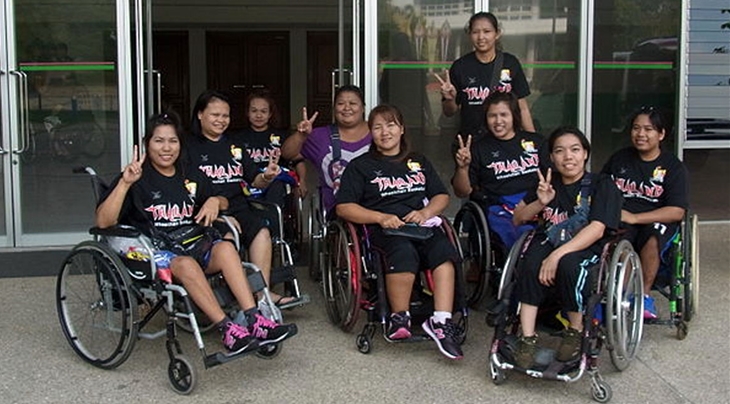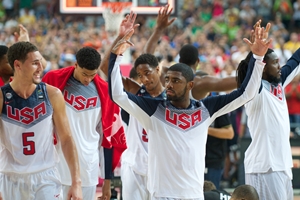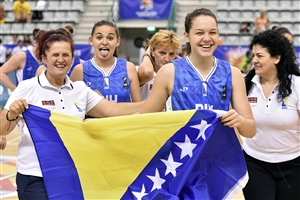
Only as strong as the weakest link
CHARLOTTE (Steve Goldberg's Wheel World) - Yesterday, the Agitos Foundation, the development arm of the International Paralympic Committee announced that among its Grant Support Program beneficiaries for 2016 would be an IWBF initiative to facilitate the development of women's wheelchair basketball in the Asia Oceania Zone (AOZ) where only three nations competed for a trip to Rio next month.
In total, the Agitos grants will support the efforts of 21 National Paralympic Committees, two International Organisations of Sports for the Disabled, one Regional Organisation and nine International Federations which will receive a portion of the EUR 650,000 which has been allocated to IPC members.
IWBF President Ulf Mehrens noted that the grant will help the IWBF introduce more countries and women within the zone to the game, "which will increase the number of countries participating in future competitions.”
The IWBF believes that improving smaller nations such as Thailand will help improve larger ones such as China in the long term. Both seen here in 2010 Asia Para Games. Photo by Xinhua/Hao Tongqian
That today is the official opening of the two month celebration of global sport that is the Olympic and Paralympic Games makes it a good time to explain why the future of sport depends on this focus on development.
The most traditional part of tonight's opening ceremony, save for the lighting of the cauldron, will be the march of nations. Though the athletes and countries will all enter tonight, and again on September 7, as equals, history tells us that will be anything but true as the competition gets underway. This is especially typical in team sports that will quickly sort out the hunters from the hunted.

All teams are equal when entering the opening ceremonies of the Paralympic Games, but that soon changes when the competition begins. Photo by Steve Goldberg/SCS Media
The women's Olympic basketball competition is a case in point where the Americans are going for their fifth straight gold medal. Last time out in London, the USA ladies went 8-0 with an average margin of 34.38 points per game. Their closest rival was Australia who fell by 13 in a semifinal. France went down by 36 in the penultimate game. Gold is gold but will that medal be as shiny as it could be?
As in all good movies or captivating books, where the greatness of a hero is only can only be measured by the challenge or villain he (or she) faces, so it goes in sport. A champion is only as good as the competition they have to overcome.
The USA's 1992 Dream Team with Jordan, Bird, Barkley, and Magic, etc. were a marvel to watch but how truly engaging are games decided by an average of nearly 50 points? The 2012 USA men won their first seven games by a margin of over 34 points but they will be remembered for taking a dramatic 107-100 decision over Spain in the gold medal final.
That this development funding is focused on the women's wheelchair game in the Asia Oceania Zone will be bittersweet for the Australians who are missing the Paralympics for the first time since 1992 and have medaled in each games since Sydney with three silver, including London, and one bronze. They were fourth in '92 and '96.
Both Japan and Australia will be watching the women's Paralympic tournament in Rio from home as the only slot was taken by China. Photo courtesy of Basketball Australia and Merritt Images
But their biggest obstacle wasn't China, who will bested the Gliders for the single slot representing women's teams from the AOZ, but the fact that there was only one slot available. Part of this was attributable to the Africa Zone fielding a women's team for the first time but the other was that no other AOZ team earned a slot at the last world championships in Toronto.
So anything that builds the competitiveness of women's teams beyond the existing trinity of Australia, China and Japan has the potential of serving them all in the long term.
The president of IWBF Asia Oceania, Saad Alazma added detail. The grant will assist the AOZ in hosting a week long camp in Bangkok for female players from throughout the zone.
"We are specifically targeting players and coaches from nations that do not have a strong women's program, and we will be offering them the opportunity to train and play under the guidance of world class coaches." - Saad Alazma
Alazma hopes that the seeds planted in Thailand will multiply as the players and coaches return home and share the experience. The ultimate objective is the creative and advancement of new national teams for the zone.
The Agitos Foundation has previously supported the development of wheelchair basketball in Angola and Uganda.
In 2013, an Agitos partner, Motivation UK, provided 50 basketball wheelchairs for use at the IWBF Africa Zone Championship in Angola.
"This event is an amazing chance for us to promote and develop Paralympic Sport in Angola and across the continent,” Leonel da Rocha Pinto, President of the Angolan and African National Paralympic Committee said at the time.
"Our recent partnership has allowed us to bring in 50 basketball wheelchairs for this competition which will remain as legacy of the event to strengthen the sport in the region."
That same year, support from Agitos, buoyed by funding from the Chinese Lions Club, helped with the introduction of the Uganda Paralympic Sports Development Project, an initiative that led to the establishment of the Uganda Wheelchair Basketball Association.
Charles Okwanga (yellow shirt) lost both legs to a land mine in 1996 but has found his way back to sport through wheelchair basketball. Photo courtesy of Ugandan Paralympic Committee
An IPC article celebrating the 2015 United Nations’ International Day of Sport for Development and Peace, published in April last year, looked back at the Uganda program, noting that, "over 100 people in six clubs practice athletics and wheelchair basketball, thanks to the distribution of eight racing wheelchairs and 14 chairs for basketball."
"After the landmine my life and dreams were shattered," Charles Okwanga said, recounting the explosion that took both his legs while he was just walking to school one day in 1996. "Before the land mine, I used to play football and I loved sports so much."
"When I heard about wheelchair basketball, I asked myself, 'How can a person like me play basketball?' But I thought, 'Wheelchair basketball; yes, I sit in a wheelchair (so) maybe I can play.' It was my first time to play a sport after the land mine."
It takes time but maybe one day Charles Okwanga may help Africa take another spot from Europe or perhaps the Americas, which has proven vulnerable past the USA and Canada for both men and women. Development of the game is needed on every continent and in every zone.
Only by strengthening the weakest links in the chain will those already strong remain so.
Steve Goldberg
FIBA
FIBA's columnists write on a wide range of topics relating to basketball that are of interest to them. The opinions they express are their own and in no way reflect those of FIBA.
FIBA takes no responsibility and gives no guarantees, warranties or representations, implied or otherwise, for the content or accuracy of the content and opinion expressed in the above article.
To help make this column as inclusive as possible, please send any national or international event information, story suggestions, or comments to wheelworldmail@gmail.com.

















